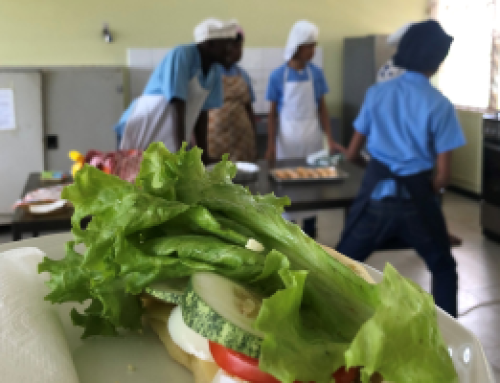By Francis Boima in Sierra Leone

While having her nutritious meal at school, Isatu Kanu (immediate right) understands how this supports her to pass her exams and be able to realise her dream of becoming a nurse. © WFP Sierra Leone.
In the serene village of Maforombie, nestled in the picturesque landscape of Kambia district, in Sierra Leone, 13-year-old Isatu Kanu wakes up to do her household chores.
An hour later, she starts heading off to school at Holy Cross Primary School where she is doing class six. With her heavy school bag hanging over her shoulder, she navigates the rough road in this rural terrain. It’s a tiring one kilometre walk she is determined to make. She knows with each step she gets closer to realising her dream of one day becoming a nurse and returning to this village to serve her community.
Isatu is among the fortunate girls receiving food at school. The meals improve her learning and gives her energy to walk back home after school.
In the districts of Kambia; Pujehun Bonthe; Kenema; and Karene, over 301,250 children in 1,067 schools are receiving school meals.
For Isatu, the food is more than a lunch meal. It’s a gift helping to improve her learning and enrich her educational experience.
“My father works as a security guard, and my mother sells palm wine and crushes stones for a living. Often, I rely on the previous day’s meal as my breakfast. But at times, there are no leftovers to eat before I go to school.”
The food she eats at school is made possible through funding from the Government of Japan and USAID, ensuring that many other children can also have a fighting chance in their education.
In many schools, the availability of at least one nutritious meal a day is improving attendance, particularly for girls like Isatu who fall prey to child marriage if they drop out of school.
The school meals are also having a positive impact on many poor families. Adamsay Bangura, Isatu’s mother, agrees the programme has reduced the financial burden on her family. Before the programme was introduced in 2018, it was hard to make sure Isatu had money to buy food at school or carry a lunch pack from home.
“Nowadays we know that even if there is nothing to eat in the morning, she will eat at school,” she said.
Patricia Kargbo, the head teacher at Holy Cross Primary School said before the introduction of school meals, it was difficult to maintain discipline at the school. “Those who did not bring food from home would often leave school early because of hunger. We are seeing a difference since we started providing meals in 2018. Our students remain in school during lunch break when they receive their meals,” she said.
The Government of Sierra Leone, a member of the School Meals Coalition, and partners continue to make efforts to ensure food is provided in schools, increasing the number of children enrolling in school and staying until they graduate. At the UN Food Systems Summit Stocktaking in Rome last year, President Julius Maada Bio committed to continue investing in the national school feeding programme, launched in 2018 and supporting over 800,000 children. The government has increased its budget for school feeding, covering 80 percent of the cost of the programme. At the same event, Germany announced a new EUR 22 million grant for Sierra Leone and Laos to implement a food systems approach to their school meal programmes.
As the sun rises over Maforombie village on each day, the collective efforts of partners supporting the government in Sierra Leone are seen through the nutritious meals putting smiles on the faces of many children, nourishing their dreams and aspirations. Through their united resolve and love, they are giving them hope, fostering a brighter future, and ensuring that no child’s dream goes unfed.




